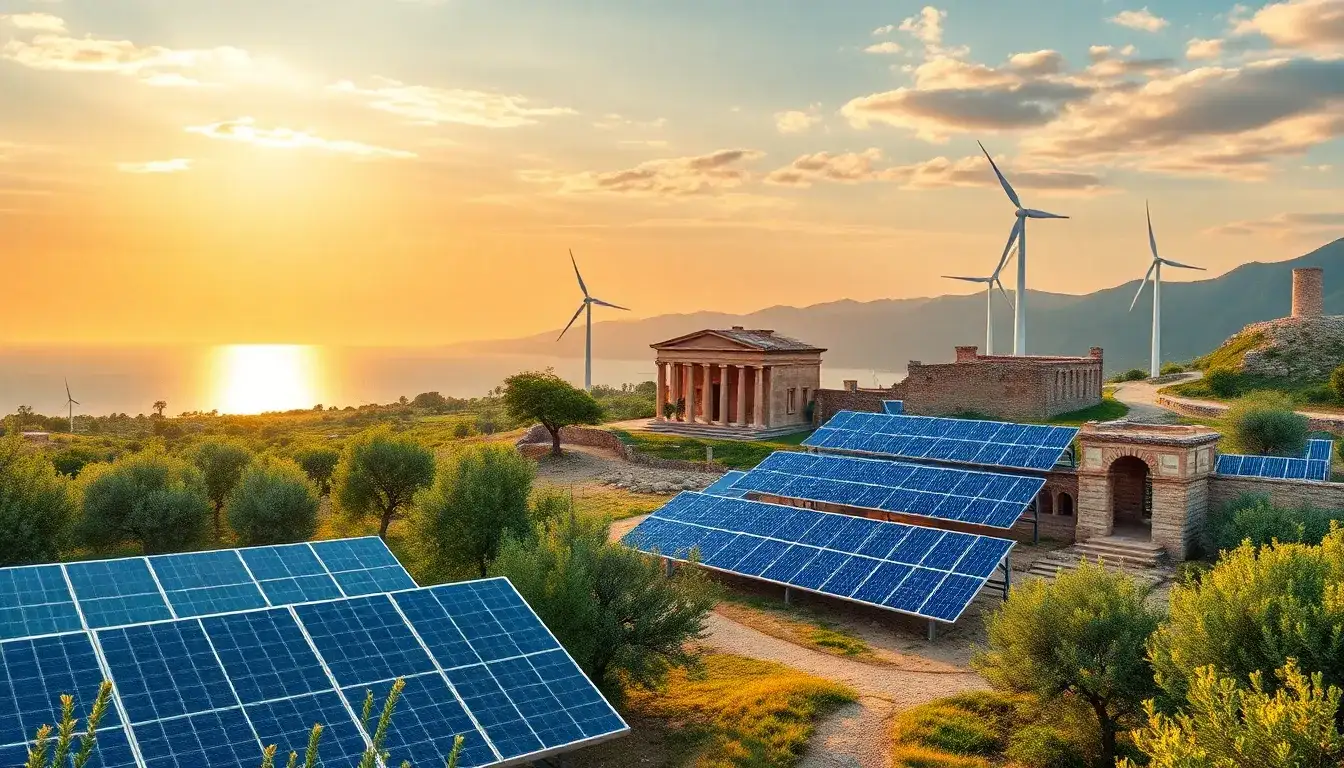
Integrating Sustainable Energy Development with Energy Ecosystems: Trends and Future Prospects in Greece
This study integrates Sustainable Energy Development (SED) with an Energy Ecosystems (EE) framework in Greece to explore how macro-level policies, meso-level infrastructures, and micro-level behaviors influence energy transitions. Drawing on historical data primarily from 2010 to 2024 and 16 semi-structured expert interviews, the research examines the dimensions of SED—including affordability, supply, consumption, and security—within the supplier-producer-distributor-consumer nexus. The findings indicate significant advancements in solar and wind energy adoption. However, challenges remain, such as high import dependency, regulatory inefficiencies, and infrastructural deficits. The study proposes targeted policy directions and a new method for local-level institutional coordination, illustrating how the synergy between SED and EE can promote resilience, innovation, and social equity. This integrated approach clarifies how meso-level dynamics can either facilitate or hinder SED goals, offering insights for developing more resilient, equitable, and innovation-driven energy policies.
Keywords
sustainable energy development; energy ecosystems; Greece; energy transition; renewable energy; macro–meso–micro analysis; energy policy integration; energy security
1. Introduction
The transition toward Sustainable Energy Development (SED) is crucial for tackling urgent global issues such as climate change and energy security. Greece, with its unique geography and evolving economic landscape, provides a compelling case study for examining the energy ecosystem. Problems like high import dependency and regulatory barriers hinder progress toward SED objectives. After emerging from a prolonged period of austerity due to a significant economic crisis, Greece’s economy is still struggling to regain momentum. Despite recent GDP growth, the average purchasing power of Greeks is around 54% of the EU mean, limiting disposable income and affecting technology adoption choices.
The economic vulnerabilities intersect with energy sector challenges, including price volatility and regulatory changes. Addressing these issues requires a comprehensive approach that integrates SED with an EE perspective, revealing interdependencies across macro, meso, and micro levels. While Greece has made strides in solar and wind energy, barriers such as limited domestic production and regulatory inefficiencies persist. This study aims to bridge SED and EE in the Greek context by examining historical trends and future prospects.
2. Theoretical Background
2.1. The Concept of Sustainable Energy Development
The concept of SED emerged from the broader framework of sustainable development, emphasizing energy’s critical role in achieving sustainability. Despite some progress, the operationalization of SED principles often stalls at the country level. Greece’s ongoing financial challenges highlight the potential of an ecosystem-based approach to provide fresh insights into energy transitions.
2.2. Energy Ecosystems in Retrospect
The EE framework focuses on the relationships among actors and institutions necessary to achieve sustainable energy outcomes. By mapping SED’s thematic dimensions onto the supplier-producer-distributor-consumer nexus, systemic bottlenecks can be identified, revealing how integrated ecosystem thinking might resolve them.
The interplay between macro-level international political economy, meso-level networks, and micro-level actors illustrates the complexities of energy transitions. Each level influences the others, with policies at the macro level shaping the operational dynamics at the meso and micro levels.
3. Methodology
This study employs a case study design to analyze how Greece’s energy transition can benefit from integrating SED with an EE framework. The research combines historical energy data with expert interviews to investigate perceived gaps and synergies across different levels of analysis. A snowball sampling technique was utilized to recruit 16 high-level experts from various sectors, enriching the findings with diverse perspectives.
4. Results
4.1. The Sustainable Energy Mix in Greece
Greece has made significant progress in its sustainable energy mix, particularly in solar and wind energy production. The Renewable Energy Statistics 2023 report by IRENA shows substantial growth in primary energy production from renewable sources. During 2020–2021, solar energy production rose from 16,009 to 18,904 terajoules (TJ), while wind energy increased from 33,516 to 37,739 TJ. The total energy supply from renewable sources increased from 151,867 to 166,057 TJ, reflecting Greece’s commitment to renewable energy development.
4.2. The Direction of the Greek Energy System Based on Recent Literature
Recent literature outlines Greece’s trajectory toward reducing reliance on lignite and transitioning to renewable energy. The National Energy and Climate Plan (NECP) estimates a need for €35 billion in investments by 2030, predominantly focused on energy efficiency and renewable energy sources. Challenges persist, including complex legislative procedures that slow the deployment of renewables.
4.3. Sustainable Energy Development in Greece
Greece’s position in sustainable energy innovation reveals significant disparities. While the country ranks low in knowledge development and diffusion, it shows potential in fostering clean energy startups. The energy supply has diversified, reducing reliance on fossil fuels, but affordability and accessibility remain pressing issues, especially for vulnerable populations.
4.4. The Greek Energy Ecosystem
The Greek EE is shaped by interrelated processes of supply, production, distribution, and consumption. Recent data indicate that while Greece has made strides in integrating renewable energy, ongoing challenges related to infrastructure and regulatory frameworks must be addressed.
5. Discussion
This study highlights the need for integrating SED with the EE framework to navigate Greece’s energy transition effectively. The findings emphasize that neither macro-level mandates nor micro-level entrepreneurial efforts alone can drive transformative change. The interplay between these levels must be harnessed to foster a more resilient and equitable energy ecosystem.
6. Conclusions
The integration of SED with an EE framework is essential for addressing Greece’s energy transition challenges. The insights gained from this study can help inform policies that promote a sustainable energy future, not only for Greece but for other regions facing similar issues. By adopting a coordinated approach across macro, meso, and micro levels, Greece can enhance its capacity to navigate the complexities of the global energy transition.
Original article by NenPower, If reposted, please credit the source: https://nenpower.com/blog/integrating-sustainable-energy-development-and-ecosystems-future-trends-and-prospects-in-greece/


